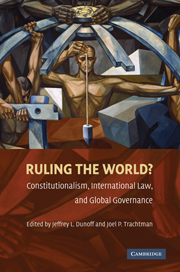Book contents
- Frontmatter
- Contents
- Contributors
- Preface: International Institutions: Why Constitutionalize?
- Acknowledgments
- PART I WHAT IS CONSTITUTIONALIZATION BEYOND THE STATE?
- 1 A Functional Approach to International Constitutionalization
- 2 The Mystery of Global Governance
- 3 The International Legal System as a Constitution
- PART II THE CONSTITUTIONAL DIMENSIONS OF SPECIFIC INTERNATIONAL REGIMES
- PART III CROSSCUTTING ISSUES
- Index
- References
3 - The International Legal System as a Constitution
Published online by Cambridge University Press: 05 June 2012
- Frontmatter
- Contents
- Contributors
- Preface: International Institutions: Why Constitutionalize?
- Acknowledgments
- PART I WHAT IS CONSTITUTIONALIZATION BEYOND THE STATE?
- 1 A Functional Approach to International Constitutionalization
- 2 The Mystery of Global Governance
- 3 The International Legal System as a Constitution
- PART II THE CONSTITUTIONAL DIMENSIONS OF SPECIFIC INTERNATIONAL REGIMES
- PART III CROSSCUTTING ISSUES
- Index
- References
Summary
Introduction
Constitutionalism and Fragmentation of the International Legal System
International lawyers have often construed international constitutionalism as an offspring of the institutionalization of international law. An international constitutionalism would be able to draw the conclusion of the increasing institutionalization of the international realm by applying principles known from domestic constitutional law to the international system, resulting in a universal Kantian “state of law,” away from the “state of nature” or anarchy of international relations. In the same vein in which a constitution unifies the domestic polity in one legal superstructure, a developed, institutional reading of international law would unify the international community in a single coherent constitutional structure.
Today, this institutionalist reading of international law has fallen prey, in a certain regard, to its own success. While an increasing institutionalization and organization of international organization can hardly be doubted, the general impression is one of fragmentation rather than constitutionalization of the international legal system. In other words, the diverse and divergent institutions fail to come under a single scheme; rather, the systemic character of international law seems threatened by a multiplicity of international régimes without obvious coherence. The constitutionalization of partial régimes appears as antidote rather than confirmation of the constitutionalization of the international legal system as a whole. Calls for a true constitutionalism that would put the different subsystem into order confirm this intuition.
- Type
- Chapter
- Information
- Ruling the World?Constitutionalism, International Law, and Global Governance, pp. 69 - 110Publisher: Cambridge University PressPrint publication year: 2009
References
- 45
- Cited by

